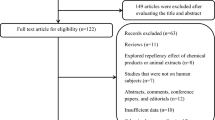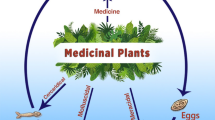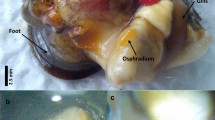Abstract
The present study aims to find efficient alternatives to synthetic anthelmintics among ethno-veterinary herbs. Ascaridia galli eggs isolated from the worm uterus were exposed in vitro to methanolic extracts (ME) of nine plant species such as Achillea millefolium (AM), Artemisia absinthium (AA), Artemisia vulgaris (AV), Cicerbita alpina (CA), Cichorium intybus (CI), Inula helenium (IH), Origanum vulgare (OV), Tanacetum vulgare (TV), Tanacetum parthenium (TP). Flubendazole (FL), 0.5% formalin with dimethylsulfoxide and Petri dishes without the addition of reagents were used as positive, negative and untreated control respectively. The effects of the different ME at concentrations 0.500, 0.325, 0.200 mg/ml were assessed on the embryonic development (ED) of the eggs in duplicate. Logit analysis was used to calculate EC50 values. A generalized linear mixed model, having plant species and concentration as fixed effect and day as repeated measure, was used to determine differences in ED. Estimated EC50 was the lowest for FL at 0.11 mg/ml. CA and TV followed with 0.27 mg/ml and 0.32 mg/ml. ED for FL was significantly lower (25%) than that of CA (47%). The analysis showed 0.5 mg/ml of the ME of CA and TV significantly affected the ED at 35% and 42% inhibitions respectively. The ED for all ME showed similar pattern i.e., relatively higher efficacy in the first experimental week compared to the rest of the experimental period. The effect from all multicomponent extracts is time and dose dependent. The plants have promising results in inhibiting ED, contributing to the identification of alternative anthelmintic treatments.





Similar content being viewed by others
Data availability
All data generated or analysed during this study are included in this published article (and its supplementary information file).
References
Abdel Aziz AR, AbouLaila MR, Aziz M, Omar MA, Sultan K (2018) In vitro and in vivo anthelmintic activity of pumpkin seeds and pomegranate peels extracts against Ascaridia galli. Beni-Suef Univ J Basic Appl Sci 7:231–234. https://doi.org/10.1016/j.bjbas.2018.02.003
Ackert JE, Herrick CA (1928) Effects of the Nematode Ascaridia lineata (Schneider) on Growing Chickens. J Parasitol 15:1–13
Alexandru L, Pizzale L, Conte L, Barge A, Cravotto G (2013) Microwave-assisted extraction of edible Cicerbita alpina shoots and its LC-MS phenolic profile. J Sci Food Agric 93:2676–2682
Athanasiadou S, Githiori J, Kyriazakis I (2007) Medicinal plants for helminth parasite control: facts and fiction. Animal 1:1392–1400. https://doi.org/10.1017/S1751731107000730
Bischoff T, Vogl CR, Ivemeyer S, Klarer F, Meier B, Hamburger M, Walkenhorst M (2016) Plant and natural product based homemade remedies manufactured and used by farmers of six central Swiss cantons to treat livestock. Livest Sci 189:110–125. https://doi.org/10.1016/j.livsci.2016.05.003
Coles GC, Jackson F, Pomroy WE, Prichard RK, von Samson-Himmelstjerna G, Silvestre A, Taylor MA, Vercruysse J (2006) The detection of anthelmintic resistance in nematodes of veterinary importance. Vet Parasitol 136:167–185. https://doi.org/10.1016/j.vetpar.2005.11.019
Collins JB, Jordan B, Baldwin L, Hebron C, Paras K, Vidyashankar AN, Kaplan RM (2019) Resistance to fenbendazole in Ascaridia dissimilis, an important nematode parasite of turkeys. Poult Sci 98:5412–5415. https://doi.org/10.3382/ps/pez379
Council of the European Union (1999) Council Directive 1999/74/EC laying down minimum standards for the protection of laying hens. In: Official Journal of the European Communities, OJ L203, pp 1–53
Daş G, Kaufmann F, Abel H, Gauly M (2010) Effect of extra dietary lysine in Ascaridia galli-infected grower layers. Vet Parasitol 170:238–243. https://doi.org/10.1016/j.vetpar.2010.02.026
Deplazes P, Eckert J, Mathis A, von Samson-Himmelstjerna G, Zahner H (2016) Parasitology in Veterinary Medicine. Wageningen Academic Publishers, Wageningen
Directive 2004/24/EC of the European Parliament and of the Council 2001/83/EC on the amending as regards traditional herbal medicinal products, Directive 2001/83/EC on the Community code trelating medicinal products for human use. Off J Eur Union L 136/85:1–6
Dotto JM, Chacha JS (2020) The potential of pumpkin seeds as a functional food ingredient: A review. Sci Afr 10:e00575. https://doi.org/10.1016/j.sciaf.2020.e00575
EC (2009) Council Regulation (EC) No 1099/2009 of 24 September 2009 on the protection of animals at the time of killing relevance. In: Official Journal of the European Communities, OJ L303, pp 1–30
Fossum O, Jansson DS, Etterlin PE, Vågsholm I (2009) Causes of mortality in laying hens in different housing systems in 2001 to 2004. Acta Vet Scand 51:3. https://doi.org/10.1186/1751-0147-51-3
Fusani P, Zidorn C (2010) Phenolics and a sesquiterpene lactone in the edible shoots of Cicerbita alpina (L.) Wallroth. J Food Compos Anal 23:658–663. https://doi.org/10.1016/j.jfca.2009.08.014
Gauly M, Bauer C, Mertens C, Erhardt G (2001) Effect and repeatability of Ascaridia galli egg output in cockerels following a single low dose infection. Vet Parasitol 96:301–307
Gautam R, Karkhile KV, Bhutani K, Jachak SM (2010) Anti-inflammatory, Cyclooxygenase (COX)-2, COX-1 Inhibitory, and Free Radical Scavenging Effects of Rumex nepalensis. Planta Med 76:1564–1569
Giovanelli F, Mattellini M, Fichi G, Flamini G, Perrucci S (2018) In Vitro Anthelmintic Activity of Four Plant-Derived Compounds against Sheep Gastrointestinal Nematodes. Vet Sci 5. https://doi.org/10.3390/vetsci5030078
Githiori JB, Athanasiadou S, Thamsborg SM (2006) Use of plants in novel approaches for control of gastrointestinal helminths in livestock with emphasis on small ruminants. Vet Parasitol 308–320. https://doi.org/10.1016/j.vetpar.2006.04.021
Graham ML, Prescott MJ (2015) The multifactorial role of the 3Rs in shifting the harm-benefit analysis in animal models of disease. Eur J Pharmacol 759:19–29. https://doi.org/10.1016/j.ejphar.2015.03.040
Guarrera PM (1999) Traditional antihelmintic, antiparasitic and repellent uses of plants in Central Italy. J Ethnopharmocol 68:183–192
Irwin JO (1943) On the calculation of the error of biological assays. J Hyg 43
Islam MA, Farjama T, Begum N, Mondal MM (2008) In vitro efficacy of some indigenous plants on the inhibition of development of eggs of Ascaridiagalli (Digenia: Nematoda). Bangl J Vet Med 6https://doi.org/10.3329/bjvm.v6i2.2330
Janczak AM, Riber AB (2015) Review of rearing-related factors affecting the welfare of laying hens. Poult Sci 94:1454–1469. https://doi.org/10.3382/ps/pev123
Jasso Díaz G, Hernández GT, Zamilpa A, Becerril Pérez CM, Ramírez Bribiesca JE, Hernández Mendo O, Sánchez Arroyo H, González Cortazar M, Mendoza de Gives P (2017) In vitro assessment of Argemone mexicana, Taraxacum officinale, Ruta chalepensis and Tagetes filifolia against Haemonchus contortus nematode eggs and infective (L3) larvae. Microb Pathog 109:162–168. https://doi.org/10.1016/j.micpath.2017.05.048
Kaufmann F, Daş G, Sohnrey B, Gauly M (2011) Helminth infections in laying hens kept in organic free range systems in Germany. Livest Sci 141:182–187. https://doi.org/10.1016/j.livsci.2011.05.015
Lacey E (1988) The role of the cytoskeletal protein, tubulin, in the mode of action and mechanism of drug resistance to benzimidazoles. Int J Parasitol 18:885–936
Lalchhandama K, Roy B, Dutta BK (2009) Anthelmintic activity of Acacia oxyphylla stem bark against Ascaridia galli. Pharm Biol 47:578–583. https://doi.org/10.1080/13880200902902463
Martin-Pacho JR, Montoya MN, Arangüena T, Toro C, Morchon R, Marcos-Atxutegi C, Simon F (2005) A Coprological and Serological Survey for the Prevalence of Ascaridia spp. in Laying Hens. J Vet Med B 52:238–242
Mayer M, Vogl CR, Amorena M, Hamburger M, Walkenhorst M (2014) Treatment of organic livestock with medicinal plants: a systematic review of European ethnoveterinary research. Complement Med Res 21:375–386. https://doi.org/10.1159/000370216
Monglo D, Njongmeta LM, Musongong G, Ngassoum M, Nukenine EN (2006) Evaluation of Anthelmintic Potential of Ethanolic Plant Extracts from Northern Cameroon Against Eggs and Infective Larvae of Haemonchus contortus. J Biol Sci 6:426–433. https://doi.org/10.3923/jbs.2006.426.433
Ochs DS, Wolf CA, Widmar NJO, Bir C (2018) Consumer perceptions of egg-laying hen housing systems. Poult Sci 97:3390–3396. https://doi.org/10.3382/ps/pey205
OECD (2013) Guidance document on developing and assessing adverse outcome pathways: series on testing and assessment: No.184, pp 1–32
Partridge FA, Murphy EA, Willis NJ, Bataille CJR, Forman R, Heyer-Chauhan N, Marinič B, Sowood DJC, Wynne GM, Else KJ, Russell AJ, Sattelle DB (2017) Dihydrobenze 1,4oxazepin-2(3H)-ones, a new anthelmintic chemotype immobilising whipworm and reducing infectivity in vivo. PLoS Negl Trop Dis 11:e0005359. https://doi.org/10.1371/journal.pntd.0005359
Rahimian S, Gauly M, Daş G (2016) Embryonation ability of Ascaridia galli eggs isolated from worm uteri or host faeces. Vet Parasitol 215:29–34. https://doi.org/10.1016/j.vetpar.2015.10.026
Ramadan HH, Abou Znada NY (1992) Morphology and life history of Ascaridia galli in the domestic fowl that are raised in Jeddah. J K A U Sci 4:87–99
von Samson-Himmelstjerna G, Coles GC, Jackson F, Bauer C, Borgsteede F, Cirak VY, Demeler J, Donnan A, Dorny P, Epe C, Harder A, Höglund J, Kaminsky R, Kerboeuf D, Küttler U, Papadopoulos E, Posedi J, Small J, Várady M, Vercruysse J, Wirtherle N (2009) Standardization of the egg hatch test for the detection of benzimidazole resistance in parasitic nematodes. Parasitol Res 105:825–834. https://doi.org/10.1007/s00436-009-1466-1
Sandoval-Castro CA, Torres-Acosta JFJ, Hoste H, Salem AZM, Chan-Pérez JI (2012) Using plant bioactive materials to control gastrointestinal tract helminths in livestock. Anim Feed Sci and Techn 176:192–201. https://doi.org/10.1016/j.anifeedsci.2012.07.023
Sherwin CM, Nasr MAF, Gale E, Petek M, Stafford K, Turp M, Coles GC (2013) Prevalence of nematode infection and faecal egg counts in free-range laying hens: relations to housing and husbandry. Br Poult Sci 54:12–23. https://doi.org/10.1080/00071668.2012.757577
Soudkolaei AS, Kalidari GA, Borji H (2021) Anthelmintic efficacy of fenbendazole and levamisole in native fowl in northern Iran. Parasit Vectors 14:104. https://doi.org/10.1186/s13071-021-04605-9
Swayne DE (ed) (2020) Diseases of poultry. Wiley-Blackwell, Hoboken NJ
Tandon V, Pal P, Roy B, Rao HS, Reddy KS (1997) In vitro anthelmintic activity of root-tuber extract of Flemingia vestita, an indigenous plant in Shillong, India. Parasitol Res 83:492–498
Tarbiat B, Jansson DS, Moreno L, Lanusse C, Nylund M, Tydén E, Höglund J (2016) The efficacy of flubendazole against different developmental stages of the poultry roundworm Ascaridia galli in laying hens. Vet Parasitol 218:66–72. https://doi.org/10.1016/j.vetpar.2016.01.012
Tarbiat B, Jansson DS, Tyden E, Höglund J (2017) Evaluation of benzimidazole resistance status in Ascaridia galli. Parasitol 144:1338–1345. https://doi.org/10.1017/S0031182017000531
Tiersch KM, Daş G, Samson-Himmelstjerna GV, Gauly M (2013) The role of culture media on embryonation and subsequent infectivity of Capillaria obsignata eggs. Parasitol Res 357–364. https://doi.org/10.1007/s00436-012-3143-z
Törnqvist E, Annas A, Granath B, Jalkesten E, Cotgreave I, Öberg M (2014) Strategic focus on 3R principles reveals major reductions in the use of animals in pharmaceutical toxicity testing. PLoS One 9:e101638. https://doi.org/10.1371/journal.pone.0101638
Urban J, Kokoska L, Langrova I, Matejkova J (2008) In Vitro Anthelmintic Effects of Medicinal Plants Used in Czech Republic. Pharm Biol 46:808–813. https://doi.org/10.1080/13880200802315618
Vogl CR, Vogl-Lukasser B, Walkenhorst M (2016) Local knowledge held by farmers in Eastern Tyrol (Austria) about the use of plants to maintain and improve animal health and welfare. J Ethnobiol Ethnomed 12:40. https://doi.org/10.1186/s13002-016-0104-0
Wangchuk P, Pearson MS, Giacomin PR, Becker L, Sotillo J, Pickering D, Smout MJ, Loukas A (2016) Compounds Derived from the Bhutanese Daisy, Ajania nubigena, Demonstrate Dual Anthelmintic Activity against Schistosoma mansoni and Trichuris muris. PLoS Negl Trop Dis 10:e0004908. https://doi.org/10.1371/journal.pntd.0004908
Williams AR, Fryganas C, Ramsay A, Mueller-Harvey I, Thamsborg SM (2014) Direct anthelmintic effects of condensed tannins from diverse plant sources against Ascaris suum. PLoS One 9:e97053. https://doi.org/10.1371/journal.pone.0097053
Williams AR, Soelberg J, Jäger AK (2016) Anthelmintic properties of traditional African and Caribbean medicinal plants: identification of extracts with potent activity against Ascaris suum in vitro (Anthelmintic properties of traditional African and Caribbean medicinal plants: identification of extracts with potent activity against Ascaris suum in vitro). Parasite 23:24. https://doi.org/10.1051/parasite/2016024
Wuthijaree K, Lambertz C, Gauly M (2017) Prevalence of gastrointestinal helminth infections in free-range laying hens under mountain farming production conditions. Br Poult Sci 58:649–655. https://doi.org/10.1080/00071668.2017.1379049
Zajíčková M, Nguyen LT, Skálová L, RaisováStuchlíková L, Matoušková P (2020) Anthelmintics in the future: current trends in the discovery and development of new drugs against gastrointestinal nematodes. Drug Discov Today 25:430–437. https://doi.org/10.1016/j.drudis.2019.12.007
Funding
The present study is part of the “HERBAL” project that has received funding from the GECT “Europe region (Euregio) Tirolo—Trentino—Alto Adige”, Interregional Project Network (IPN 119), Nr. 25/2018, 3rd call.
Author information
Authors and Affiliations
Contributions
Ioanna Poulopoulou: Conceptualization, Methodology, Investigation, Resources, Analysis, Writing original draft, Review draft; Mark James Horgan: Resources, Review draft; Bianka Siewert: Resources, Methodology, Review draft; Michaela Siller: Resources; Luisa Palmieri: Resources, Review draft; Eftychia Martinidou: Resources; Stefan Martens: Review draft, Funding acquisition; Pietro Fusani: Resources, Review draft; Veronika Temml: Resources, Review draft; Hermann Stuppner: Review draft, Funding acquisition; Matthias Gauly: Conceptualization, Methodology, Review Draft, Project administration, Funding acquisition, Supervision.
Corresponding author
Ethics declarations
Conflict of interest/Competing Interests
The authors have no relevant financial or non-financial interests to disclose. The authors have no competing interests to declare that are relevant to the content of this article.
Ethics approval
No approval of research ethics committees was required to accomplish the goals of this study because experimental work was conducted using invertebrate species.
Consent to participate
Not applicable.
Consent for publication
Not applicable.
Additional information
Publisher's note
Springer Nature remains neutral with regard to jurisdictional claims in published maps and institutional affiliations.
Supplementary Information
Below is the link to the electronic supplementary material.
Rights and permissions
About this article
Cite this article
Poulopoulou, I., Horgan, M.J., Siewert, B. et al. In vitro evaluation of the effects of methanolic plant extracts on the embryonation rate of Ascaridia galli eggs. Vet Res Commun 47, 409–419 (2023). https://doi.org/10.1007/s11259-022-09958-9
Received:
Accepted:
Published:
Issue Date:
DOI: https://doi.org/10.1007/s11259-022-09958-9




